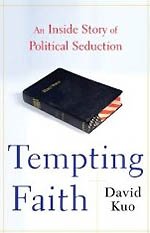 The publication of David Kuo's new book, Tempting Faith: An Inside Story of Political Seduction, could drive an even greater wedge between Republicans and faith-based groups just before the November elections.
The publication of David Kuo's new book, Tempting Faith: An Inside Story of Political Seduction, could drive an even greater wedge between Republicans and faith-based groups just before the November elections.Following closely on the heels of the Mark Foley scandal, Kuo's book, with an October 16 publication date, promises to shine some much-needed light into a very murky corner - the actual uses of the Office of Faith-Based and Community Initiatives. Kuo served as the Office's deputy director during Bush's first term and has questioned the administration's dedication to the program since leaving.
In an article for Beliefnet published last year, Kuo wrote:
I left the White House in December 2003. By that time, I'd grown quite frustrated with White House and Congressional approaches to faith-based issues and I let those in power know it. Virtually everything I've written here I told to those above me more than a year ago. I hoped things would change . . .
In 2000, Gov. Bush said, "I know that economic growth is not the solution to every problem. A rising tide lifts many boats, but not all." He then went on to propose a new approach to those who were still stuck behind. The promises are still there and I am trying to keep the faith.
He blamed the administration for failing to keep its promises and said the White House came to realize it didn't need to give money to charities, faith-based or otherwise, because religious conservatives were content just to have the Office.
And since this community's most powerful leaders - men like James Dobson of Focus on the Family - weren't anti-poverty leaders, they didn't care about money. The Faith-Based Office was the cross around the White Houses' neck showing the president's own faith orientation. That was sufficient.
John J. DiIulio, who headed the Faith-Based Initiatives Office until becoming the first top Bush official to resign in August 2001, told Esquire magazine a year later that the White House was obsessed with the politics of the faith-based initiative but dismissive of the policy itself, according to the Washington Post.
The WSJ Washington Wire said of Kuo's book this morning, "A person familiar with [the] book’s content says it will characterize [the] centerpiece of Bush’s compassionate conservatism as 'big talk, little action.'"
No comments:
Post a Comment